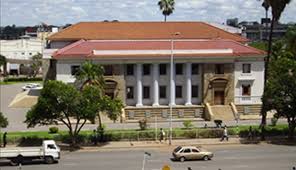Workers for Harare Water Sewerage Department are appealing for the government to intervene in a dispute with their employer regarding the improvement of working conditions and salaries to enable them to offer residents efficient service delivery.
On 4 January 2021, the workers downed tools and approached the Harare City Human Resources department to present to them a plethora of challenges they felt needed urgent attention.
“As the sewerage department domiciled at the Harare Water Main Workshop, we are appealing for protective clothing, COVID-19 allowance, and a proper grading system among a host of needs that authorities seem to be turning a blind eye to,” said Andrew Mapisaunga, a worker in the Harare Water’s sewerage department.
The HR department promised to escalate the matter to their superiors at the city’s headquarters.
“Our concerns were brought to the attention of representatives from the city’s industrial relations department. Mr. Mukonyo, Mr. Chinyanga and Mr. Dhimba who is responsible for safety are among the superiors that we approached and outlined our grievances to.
“We were clear to them that we haven’t received adequate protective clothing since 2016. Unfortunately, our leaders haven’t come back to us with satisfactory answers regarding our grievances and our job action is continuing,” said Mr. Samuel Maporisa.
Ernest Chikwena, a senior operator in the sewerage department bemoaned the fact that despite being a critical technician for the city, he was earning a paltry RTGS$13 000 that is an equivalent of only US$100.
“It seems that the city council disregards our department despite the critical role it plays in as far as service delivery to residents is concerned. As technicians, our expectation is for our salaries to meet at least the benchmark of the poverty datum line but alas, it is a far cry. We are classified as essential service providers yet our salaries are not compatible with that paid to municipal traffic enforcement and fire technicians, for example,” Mr. Chikwena said.
He bemoaned the fact that sewerage department workers are exposed to diseases such as cholera, diaarhoea and typhoid.
The workers are appealing to authorities to make sewerage works a standalone department divorced from the City of Harare and making it a commercial entity that works towards earning profits.
The sewerage department is the one that services boreholes at shopping centres and schools in the residential areas under Harare City Council.
To illustrate the level of complacency by their superiors, the works bemoaned the fact that service vehicles are allocated a paltry 20 litres of fuel per week while private vehicles owned by the bosses are allocated full tanks per week.
Ratepayers are up against workers in this department because raw sewer is flowing along the streets in residential suburbs.
Mr. Precious Shumba, the Director of the Harare Residents Trust said the City of Harare has a duty to address all the needs of the sewerage division in Harare Water.
“The workers have worked without safety and protective clothing. The Council management and the Councillors have to be responsive to the urgent needs of their workers providing an essential service. The Harare Residents Trust urges the workers and their management should find a quick solution to the crisis at hand. They should avoid allowing the situation to degenerate into a long drawn battle over working conditions while service delivery continues to suffer,” Mr. Shumba said.
In Harare, most city fathers are at loggerheads with law enforcement agents since they are allegedly embroiled in corruption activities.
Michael Chideme, the Spokesperson for Harare City Council was not available for a comment since both his mobile phones were unavailable by the time of going to print.






